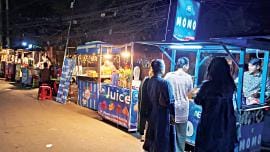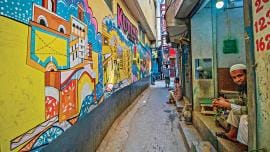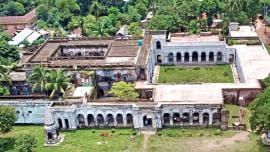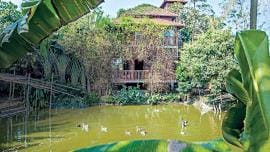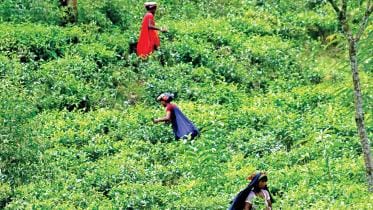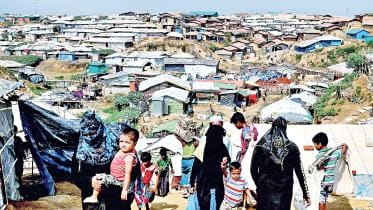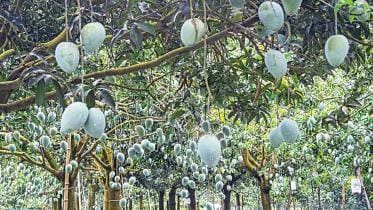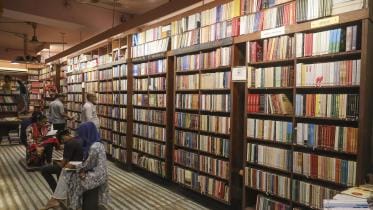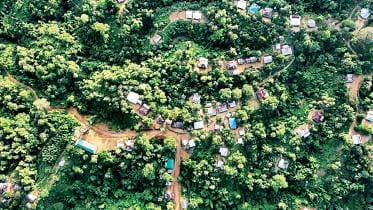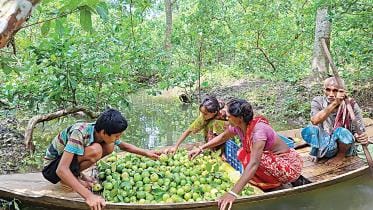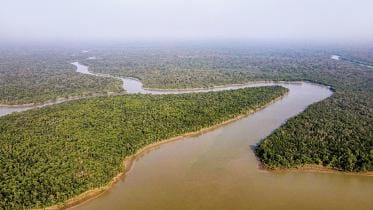Handcrafting Heritage / How one family keeps the 'Tepa Putul' tradition alive
12 December 2025, 19:50 PM
Top News
A taste of Dhaka: Street snacks you shouldn’t miss
5 December 2025, 18:58 PM
Weekend Read
The chef who put home cooks: At heart of global cuisine
28 November 2025, 18:48 PM
Weekend Read
When the alleys knew our names
21 November 2025, 18:27 PM
Weekend Read
Haripur Zamindar Bari in Brahmanbaria / On the banks of Titas, a palace fading into memory
14 November 2025, 20:04 PM
Weekend Read
The magic of ras utsab / A night of dance, music and devotion
7 November 2025, 18:34 PM
Weekend Read
Taxidermy: Preserving life through art, science
31 October 2025, 19:28 PM
News
Choosing peace over pace
24 October 2025, 19:35 PM
Weekend Read
The mantas: A life adrift
17 October 2025, 18:57 PM
Top News
Echoes of grandeur linger in Haturia’s fading palaces
10 October 2025, 19:09 PM
Top News
How one family keeps the 'Tepa Putul' tradition alive
Today, the face of toys has changed, and with it, the fate of traditional toys and crafts
12 December 2025, 19:50 PM
A taste of Dhaka: Street snacks you shouldn’t miss
I decided to compile a random list of street snacks for the bohemian souls of Dhaka. The range of street food in Dhaka is so extensive that some of us have yet to taste new treats at any random street corner or alley in this maze of a city.
5 December 2025, 18:58 PM
The chef who put home cooks: At heart of global cuisine
Asma Khan is an advocate for women’s empowerment through food -- honest, eloquent, and unapologetically frank.
28 November 2025, 18:48 PM
When the alleys knew our names
There was a time when Dhaka’s narrow lanes knew us better than we knew ourselves. Long before the flyovers sliced the sky and long before every passer-by walked around wrapped in earbuds like private citizens of their own worlds, these alleys held entire universes.
21 November 2025, 18:27 PM
On the banks of Titas, a palace fading into memory
The Haripur Zamindar Bari in Brahmanbaria’s Nasirnagar upazila stands in quiet resignation, its ageing walls holding the weight of a world long gone.
14 November 2025, 20:04 PM
A night of dance, music and devotion
As the full moon of Agrahayan rises, the Manipuri community in greater Sylhet prepares to celebrate its most cherished festival -- Maharas Leela, or Ras Utsab.
7 November 2025, 18:34 PM
Choosing peace over pace
“Time is money” -- this capitalist anthem has forced us, the modern world citizens, to optimise and monetise every second of our waking hours. We compute our accomplishments quantitatively, without regard for the quality of the task done.
24 October 2025, 19:35 PM
The mantas: A life adrift
Despite centuries of life on the water, the Mantas remain invisible in official records.
17 October 2025, 18:57 PM
Echoes of grandeur linger in Haturia’s fading palaces
Tucked away on the banks of the Jamuna in Pabna’s Bera upazila, the remote village of Haturia holds on to a remarkable past.
10 October 2025, 19:09 PM
The struggle against concrete invasion
From the beaches of Cox’s Bazar and Kuakata to the hill slopes of Sajek Valley and the wetlands of Sylhet, Bangladesh’s major tourist destinations are expanding without proper planning or regulation..Makeshift shops, unauthorised hotels, risky embankments, and unregulated boating threaten
3 October 2025, 19:24 PM
Durga Puja: A symphony of faith and festivity
Under the autumn sky, sunlight and clouds play hide-and-seek as Kashful sway gently in the breeze.
26 September 2025, 19:06 PM
Hunger and hardship behind every leaf
Malnutrition grips tea workers, especially women, as wages fall short of basic food needs
19 September 2025, 19:10 PM
In bamboo shelters, Rohingya women stitch new futures
About 34 kilometres southeast of Cox’s Bazar, the sprawling Rohingya camps in Ukhiya stretch across hills and valleys, their bamboo walls and tarpaulin roofs forming temporary shelters crowded with people and stories too often left untold.
12 September 2025, 19:00 PM
A shopper’s paradise on a budget in the heart of Dhaka
Holiday markets, weekend farmer’s markets, night markets, thrift markets -- these are the places that always seem to trigger my spending compulsion.
5 September 2025, 19:01 PM
Sapahar: The heartland of mango trade
If you stand at the Charmatha Zero Point of Naogaon’s Sapahar upazila town between June and August, all you see for nearly 2.5 kilometres in every direction are vehicles laden with crates of mangoes. .A decade ago, such a sight was unimaginable for locals..For three months each year,
29 August 2025, 19:55 PM
Of bookstores & reading clubs
Getting back to the pages of an unread novel, lying by your bedside for months, is indeed a great thing.
22 August 2025, 18:26 PM
From Dhaka to Kunming for a cure
When 23-year-old Jannatul Nayeem boarded a flight from Dhaka to Kunming, he carried more than a suitcase. Packed alongside his clothes was the weight of a stubborn spinal disc problem -- and months of frustration over elusive diagnoses and dead ends.
15 August 2025, 19:19 PM
Panchhari life in nature’s gentle embrace
Cradled in the rolling, green embrace of Khagrachhari’s Panchhari, the small villages feel like a place where time slows down to match the rhythm of nature.
8 August 2025, 19:13 PM
A floating mosaic of guavas, baskets and people
During the monsoon, Jhalakathi transforms into a floating paradise. Bhimruli guava market comes alive with boats carrying farmers, buyers, and tourists.
1 August 2025, 19:47 PM
Where the forest feeds and fades
As the morning mist lifts over the vast expanse of the Sundarbans, the rhythmic splash of oars fills the air. Small wooden boats, mostly paddled by women, glide through narrow canals and creeks of the mangrove forest.
25 July 2025, 19:06 PM




